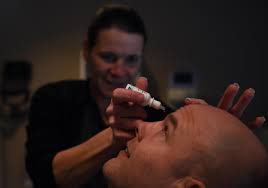In dry climates such as Denver, winter can be a difficult time to take care of the body. Chapped lips and parched hands are prevalent, leading most people to apply lotion and lip-balm regularly. However, many people do not think about the effect of the dry air on the eyes until they begin to experience symptoms. Cold wind, as well as exposure to the drying effect of heaters indoors, can lead to dry eyes in addition to dry skin and lips. There are other factors that can lead to eye discomfort in the winter. Here are a few of the problems unique to winter along with some of the best tips to keeping your eyes healthy during the cold winter months.
More Time Indoors
In the wintertime, individuals tend to spend more time indoors. This can lead to excessive use of electronics such as the phone, television, or computer. More time on these devices also means more strain for the eyes. It is a good idea to take frequent breaks and let the eyes focus on something far away for a few seconds before returning to the activity. It is also a good idea to take the time to bundle up and spend a few minutes outside. Spending too much time indoors can expose the body to more germs and deprive it of the exercise needed to be healthy and strong.
Winter Sports
There are many fun ways to enjoy the snow during the winter. Many individuals in Colorado enjoy hitting the slopes with their skis or snowboards and children love to trudge to the nearest hill to enjoy an afternoon of sledding. However, many people do not consider the effect of the bright winter sun on the eyes. The sun reflecting off of the bright white snow can be almost as blinding as looking directly into a light. It is important to protect the eyes by wearing high-quality sunglasses to protect from the UV rays.
Seasonal Illness
Seasonal illnesses such as colds and the flu can have a profound effect on eye health. Even a simple cold can cause the eyes to be sensitive to the light, drier than usual, and itchy. Viral and bacterial infections can also spread during the winter. One of the most important tips for avoiding problems is to take care not to rub the eyes. Doing so can cause viruses and bacteria to enter the body, making an individual sick. Rubbing the eyes when sick can also cause the bacteria from the nose and mouth to be transferred to the eyes leading to pink eye. In addition, it is a good idea to make sure the body is getting enough Omega-3 through diet and supplements. Doing so can help keep the eyes healthy.
Dry Air
Dry air is one of the main causes of eye discomfort during the winter. There are many ways to help prevent and treat dry eye to stay more comfortable. Keeping the temperature a little bit cooler in the home can help as well as staying away from direct heat sources such as a fire or a heater. Eye drops can be used in the morning and evening to provide the eye with the extra moisture that it needs. Gel eye drops can be applied before bed to keep the eyes from getting too dry during the night.
Winter can be a challenging time for eye health. Winter sports, illnesses, and too much time indoors can lead to dryness and discomfort. Focusing on eye health, staying away from heat sources, wearing sunglasses, and using eye drops can all help to alleviate these uncomfortable symptoms.

